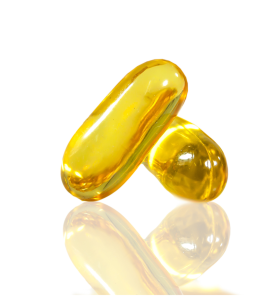I can fully sympathize with your condition!
It’s true that many sharks have scales, but not the type which render it a kosher fish. There are 4 general categories of scales, and the shark’s scales are called “Placoid scales.” These scales are attached deep into the fish’s skin, in a way that they don’t peel off, unless you would tear the skin. One sign of kosher scales (Cycloid scales) is that they easily peel off the fish in a way that they don’t tear the skin. Sharks are certainly not kosher.
Your question, however, has been dealt with in responsa literature going back many generations. It seems that even hundreds of years ago, the medical profession recognized the powerful benefits of fish oil for numerous conditions.
One question that was sent to a prominent Rabbi concerning a breathing condition where non-kosher fish oil was prescribed. The Rabbi issued a leniency based upon the following logic:
The Code of Jewish Law rules that nearly all forbidden foods can be ingested to cure a sickness, even if that sickness is not life-threatening, as long as the non-kosher food is ingested “shelo k’derech achilasan,” not in the normal manner of consumption. The Torah only forbids eating non-kosher when it is eaten in the normal manner of its consumption. When ingestion in an abnormal manner, the consumption is only forbidden under a rabbinical decree. This rabbinical decree was never enacted in the situation of eating as a cure for a sickness.
Divrei Chaim rules, therefore, that ingesting fish oil on its own is not the normal manner of consumption. Normally one only adds oil to another food to inhance its flavor, but it is not normally eaten or drunk on its own.
Therefore, to take a tablespoon of straight oil is permitted for the cure of a sickness.
A similar ruling was rendered by another early rabbinical authority, when a doctor prescribed to take fish oil to cure a condition where the petitioner’s legs stopped working properly. This rabbi says ideally the oil should be in a capsule, rendering it even further not the normal manner of consumption, but that stipulation is not required if impractical.
There are authorities who define “normal manner of consumption” not on the mode of the person’s consumption, but the state of the food. According to them, something must be done to the food itself to cause it to lose its flavor, in order to render it in the permitted category for such consumption. To fulfill that opinion, one should add a bit of vinegar to the oil right before taking it, as the vinegar diminishes whatever good taste was in the oil. If this is difficult to swallow (no pun intended), you may rely upon the previous authorities and take it as it is.
May G-d send you a speedy recovery!
Sincerely,
Rabbi Yerachmiel Fried



